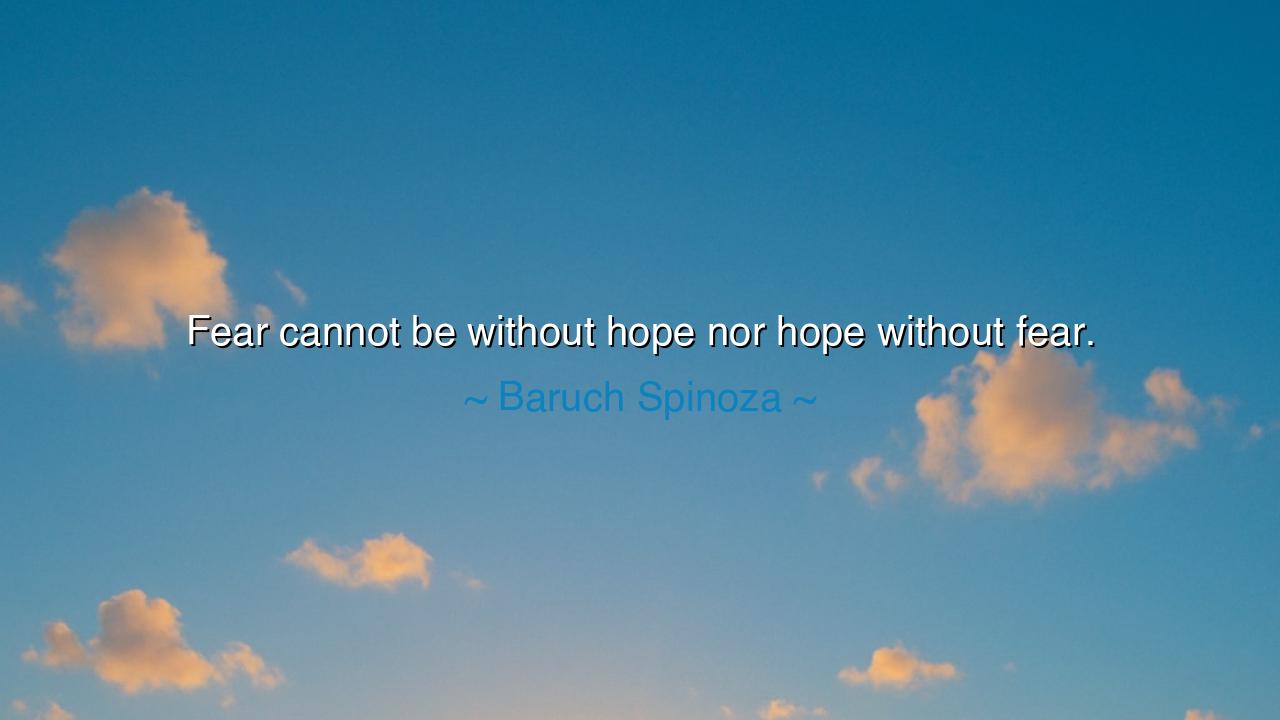
Fear cannot be without hope nor hope without fear.






The philosopher Baruch Spinoza, in his deep contemplation of the human spirit, declared: “Fear cannot be without hope nor hope without fear.” These words, though brief, are like twin flames dancing in the wind — opposite, yet bound in their movement. Spinoza, seeker of divine reason, gazed into the heart of mankind and saw that fear and hope are not two separate paths, but two threads of the same fabric. One cannot exist without the other, for both are born from our yearning — our desire for what might be. To fear is to imagine loss; to hope is to imagine gain. Both spring from the same root: the uncertainty of life, the trembling between light and shadow.
The ancients would have understood this paradox well. They spoke often of the balance between opposites — night and day, war and peace, life and death — and Spinoza’s words stand among them as a revelation of the heart’s balance. Fear, the dark cloud, exists only because there is something precious we wish to preserve. We fear losing what we love, failing at what we desire, or falling short of what we believe we could become. Yet in that very trembling lies hope, for the mind dares to imagine another outcome — that perhaps the loss will not come, that the battle can be won, that the dawn will follow even the longest night. Thus, the wise see that hope and fear are not enemies, but twin guardians standing watch over the soul.
Consider the tale of Pericles, the great Athenian statesman. During the Peloponnesian War, when Athens was beset by plague and despair, Pericles stood before his people and spoke not merely of courage, but of endurance. He told them that though they feared defeat, it was because they still hoped for victory; and that their hope would only endure if they were willing to confront their fear. History tells us that Athens fell, but the ideal he spoke of — the harmony between fear and hope — lived on. For even in loss, the Athenians found meaning; their fear had driven them to valor, and their hope had carried them through the storm.
This is the eternal truth that Spinoza sought: to live without fear is to live without hope, and to live without hope is to cease truly living. The man who claims he fears nothing has abandoned his dreams; the one who claims he hopes without fear has not yet faced reality. Life’s greatness lies in the dance between these two forces. When we strive toward something noble, fear will always whisper — but that whisper is not our enemy. It is the echo of hope reminding us that what we seek is worth striving for.
In every great heart there is both trembling and resolve. The mother fears for her child, yet hopes in their future. The sailor fears the waves, yet hopes for the distant shore. The artist fears the emptiness of the page, yet hopes to fill it with beauty. The warrior fears death, yet hopes for glory. Thus, fear and hope are the pulse of courage itself. They are the proof that we are alive, aware of both peril and possibility. To deny them is to numb the spirit; to accept them is to become whole.
Yet, the wise do not allow either to rule them. When fear grows greater than hope, despair takes root, and the soul withers. When hope swells without fear, arrogance blinds us, and we fall unprepared. The path of wisdom lies between them — to feel both, yet to let neither chain the will. Spinoza taught that reason, like a steady flame, must guide the heart through the winds of emotion, so that fear may warn, and hope may inspire, but neither may destroy.
From this teaching, let us take a lesson to carry in our own lives: do not flee from fear, and do not cling blindly to hope. Instead, walk with both as companions on your journey. When fear rises, see in it the reflection of what you value most. When hope glows, let it remind you of your strength. The man or woman who learns to honor both becomes unshakable — not because they are fearless, but because they have made peace with fear.
So, to you who walk this winding road of life: when your heart trembles before the unknown, remember Spinoza’s wisdom. You fear because you hope, and you hope because you fear. Embrace both. Let them sharpen your purpose as flint and steel strike to make fire. For only through their union can the soul awaken, and from that flame, light the path for generations to come.






AAdministratorAdministrator
Welcome, honored guests. Please leave a comment, we will respond soon